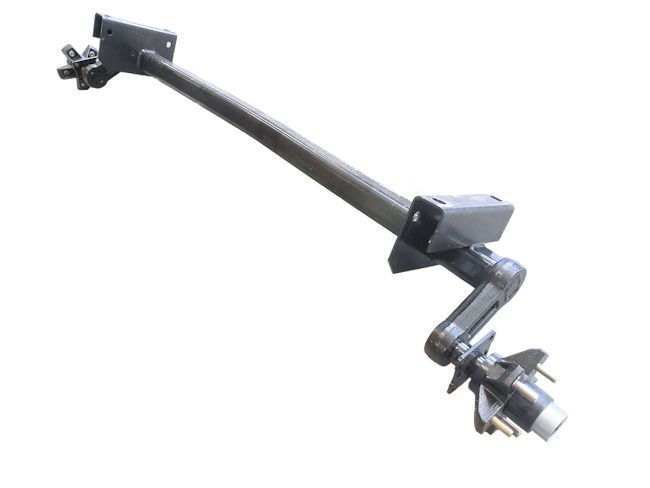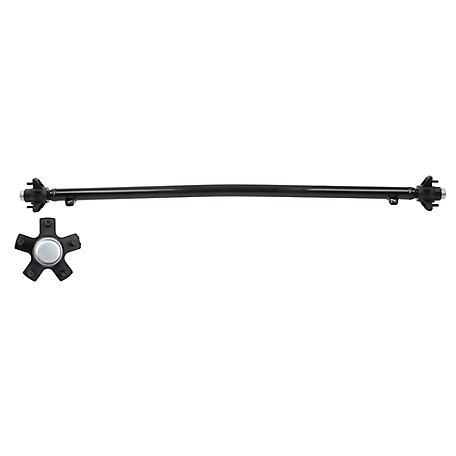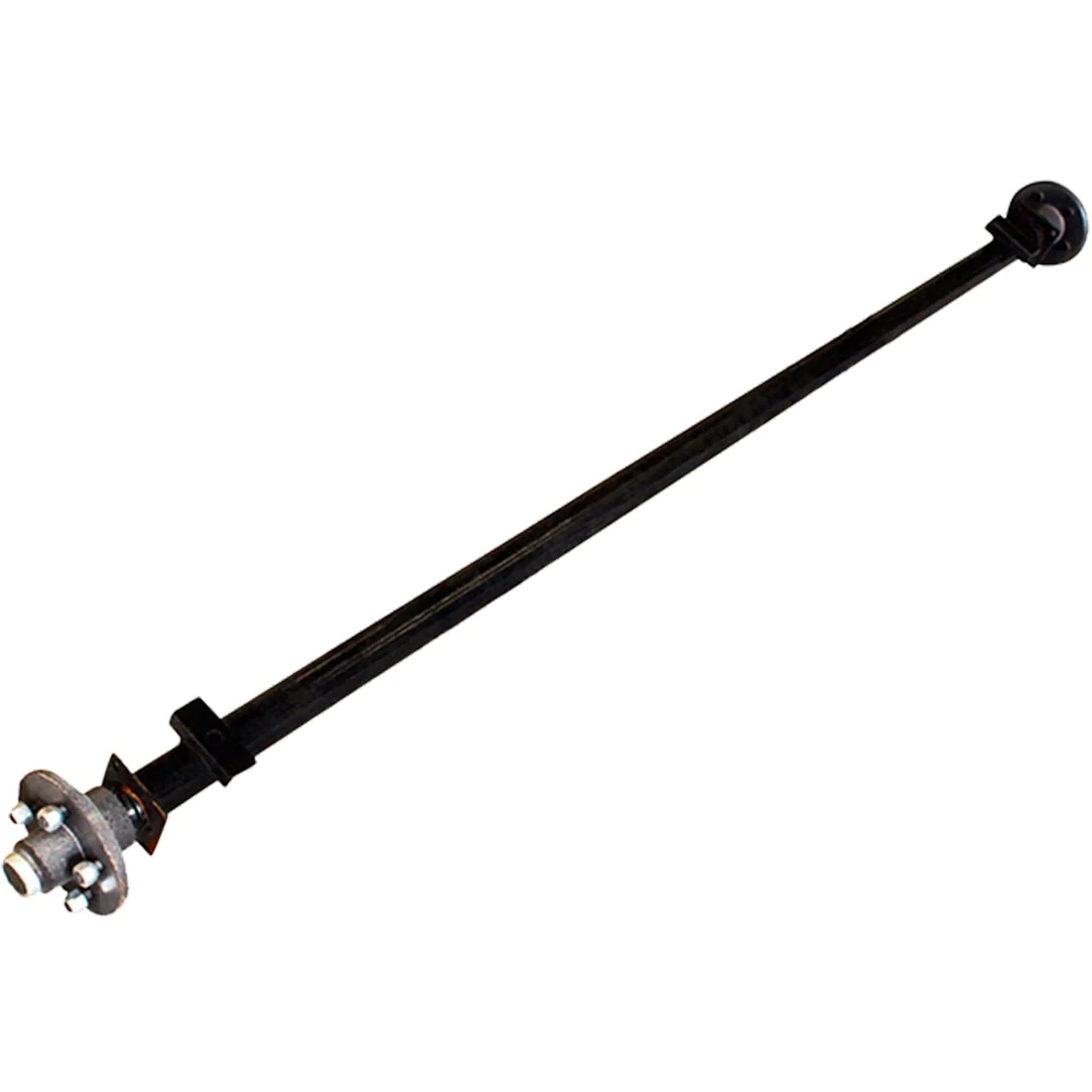Product Description
PRODUCT CHARACTERISTICS of Heavy Duty Low Price 13tons Truck Semi Trailer Axle Type
1. One-piece high quality special heat tube, low alloy steel shaft bearing capacity is strong, light weight, long life and other characteristics;
2. Product configuration wear sensor alarm device;
3. The wheel hub system maintenance simple, wearing parts in any place can buy;
4. The caliper, brake disc, gas chamber adopts domestic well-known brand, has many characteristics, such as crack resistance, long service life
5. Special heat treatment, low alloy steel axle beam, good comprehensive performance, strong bearing capacity, low dead weight;
6. High quality alloy solid spindle provides superior fatigue resistance through integral heat treatment;
7. Camshaft adopts special sealing processing to ensure that grease will not enter the brake drum, which is more safe;
Specification of Heavy Duty Low Price 13tons Truck Semi Trailer Axle Type
. New tight fit wheel hubcap, O-ring seal, good sealing performance;
F: Shaft Tube Construction Code:
F-150 Integral Square axis
H-150Square axis for welding
K-127 Integral Square axis
W-120Integral Square axis
Y-127 integral round shaft
R-146 integral round shaft
N-152 integral round shaft
D-89 welding round shaft
S-120Square axis for welding
. Extend the free maintenance time
|
item |
value |
|
Use |
Trailer Parts |
|
Parts |
Trailer Axles |
|
Max Payload |
13ton |
|
Size |
1840mm |
|
Place of Origin |
China |
|
Brand Name |
CZPT |
|
Product Name |
Trailer Axle |
|
Material |
Steel |
|
Color |
Customer Demands |
|
MOQ |
1 pc |
|
Package |
Standard Package |
Suspension For Trailer: wooden tray or others ways according to your requirements.
CZPT Export all kinds of trailers, trailer parts and Man-hand Welding Machinery, Automatic Welding machinery, Trailer Production Line,trailer Axle, brake assemblies , backing plates,brake drums and hubs Etc. We can supply the right product in shortest ways and cheapest value.
Competitive steady-going quality, competitive prices and better services, our products are well exported to North America, Europe and Oceania. Strong technical force, sophisticated manufacturing equipment, professional production team, for product innovation, research and development, quality assurance provides a solid backing.
/* March 10, 2571 17:59:20 */!function(){function s(e,r){var a,o={};try{e&&e.split(“,”).forEach(function(e,t){e&&(a=e.match(/(.*?):(.*)$/))&&1
| After-sales Service: | Free After Service |
|---|---|
| Warranty: | Free After Service |
| Type: | Axle |
| Certification: | ISO/TS16949, CCC, ISO |
| Loading Weight: | 25T |
| ABS: | Without ABS |
| Samples: |
US$ 1200/Piece
1 Piece(Min.Order) | |
|---|
| Customization: |
Available
| Customized Request |
|---|

How do trailer axles enhance the overall towing experience and safety?
Trailer axles play a significant role in enhancing the towing experience and safety in several ways:
- Load Distribution: Axles are strategically positioned to distribute the trailer’s load evenly. Proper load distribution prevents swaying, fishtailing, or trailer instability, ensuring a safer towing experience.
- Weight-Bearing Capacity: The load-bearing capacity of trailer axles is designed to handle specific weight limits. This capacity is crucial for safe towing, preventing overloading that can lead to accidents.
- Control and Stability: Axles with adequate weight capacity and the right placement contribute to better control and stability. They minimize the risk of losing control of the trailer, especially during sudden stops or maneuvers.
- Braking Systems: Many trailer axles are equipped with integrated brake systems or are compatible with trailer brakes. Braking systems enhance safety by allowing the driver to control the trailer’s speed and reduce braking distance.
- Suspension: Trailer axles often feature suspension components that absorb shocks and vibrations, improving the ride quality and overall control. This minimizes the risk of cargo shifting during transit.
- Maneuverability: Properly configured axles improve a trailer’s maneuverability, making it easier to navigate tight corners, reverse, and park. This is especially important for drivers when towing in crowded or confined spaces.
- Adaptability: Different axle types are designed for specific applications, whether for standard road use, off-road adventures, or marine environments. Using the right axles for the intended purpose enhances safety and performance.
- Corrosion Resistance: Trailers equipped with axles made from corrosion-resistant materials, such as galvanized or aluminum axles, are better suited for marine and coastal regions. They maintain their structural integrity and safety features even in corrosive environments.
- Load Balance: The axles’ load-balancing capabilities contribute to better trailer balance. Proper balance prevents overloading on one side and minimizes the risk of rollovers or accidents.
- Compliance with Regulations: Trailer axles must meet legal weight limits and safety standards. Ensuring compliance with these regulations is essential for safe and legal towing.
In summary, trailer axles are integral to a safe and enjoyable towing experience. They support load distribution, stability, control, and various safety features that prevent accidents and mishaps during towing.

What are the key considerations when selecting the right trailer axle for a specific application?
Choosing the appropriate trailer axle for a specific application involves several critical considerations:
- Weight Capacity: Determine the maximum weight the axle will need to support. This includes the trailer’s payload and the weight of the trailer itself. Ensure the selected axle has a weight capacity that exceeds the application’s requirements to provide a safety margin.
- Axle Type: Select the axle type based on the application. Common types include straight axles, drop axles, and torsion axles. The choice depends on factors like ground clearance, load height, and suspension design.
- Axle Configuration: Decide on the number of axles needed. Single axles are suitable for lighter loads, while tandem and tri-axle configurations offer higher weight capacities. Multi-axle setups provide better weight distribution.
- Suspension Type: Choose the appropriate suspension system, such as leaf spring, air ride, or torsion suspension. The suspension affects ride quality, load stability, and maintenance requirements.
- Brake System: Consider the braking requirements. Larger and heavier trailers often require electric or hydraulic brakes. Ensure the axle accommodates the necessary brake system, including the brake size and type.
- Axle Material: Select the axle material, typically steel or aluminum. Steel axles are durable and cost-effective, while aluminum axles are lighter and corrosion-resistant. The choice depends on the application’s demands and budget.
- Hub and Spindle Type: Choose hubs and spindles compatible with the axle. The hub style affects the type of wheel and tire you can use, while spindle size impacts weight capacity and bearing compatibility.
- Wheel Bolt Pattern: Ensure the axle’s hub and wheel bolt patterns match to avoid compatibility issues with the wheels and tires you plan to use.
- Ground Clearance: Consider the required ground clearance for the application. Lower ground clearance may be suitable for highway travel, while off-road or specialty trailers may need increased clearance.
- Legal Compliance: Ensure that the selected axle and trailer configuration comply with local and national regulations regarding weight limits, axle spacing, and safety requirements.
- Manufacturer and Warranty: Choose a reputable axle manufacturer with a track record for quality and durability. Check the warranty and support offered by the manufacturer.
- Budget: Evaluate the budget constraints for the axle and select an option that balances cost-effectiveness with meeting the application’s needs.
By carefully considering these factors, you can select the right trailer axle that ensures safe and efficient performance for your specific application.

What is a trailer axle, and how does it differ from vehicle axles?
A trailer axle is a fundamental component of a trailer’s suspension and load-bearing system. It differs from vehicle axles in several ways:
1. Load-Bearing Purpose:
– Trailer axles are designed primarily for load-bearing, meaning they support the weight of the trailer and its cargo. Vehicle axles, on the other hand, bear the weight of the vehicle itself and its occupants.
2. Articulation:
– Vehicle axles are usually fixed in place and do not articulate independently. Trailer axles, especially in multi-axle configurations, often feature independent articulation to improve stability and weight distribution. This allows each wheel to move independently over uneven terrain.
3. Braking Systems:
– Vehicle axles are directly connected to the vehicle’s braking system. In contrast, trailer axles can have their own braking systems, such as electric or hydraulic brakes, which are controlled separately from the towing vehicle. This setup improves braking control and safety.
4. Suspension Type:
– Trailer axles often use leaf spring or torsion suspension systems, which are optimized for load-bearing and cargo stability. Vehicle axles utilize various suspension types, including independent suspension, to prioritize ride comfort and handling.
5. Steering:
– Vehicle axles are integral to steering, allowing the vehicle to change direction. Trailer axles do not contribute to steering; instead, the towing vehicle controls the trailer’s direction through the hitch or coupler.
6. Wheel Attachment:
– Vehicle axles are typically fixed to the vehicle chassis, while trailer axles may use a variety of attachment methods, including leaf spring mounts or torsion arm attachments, to accommodate articulation and weight distribution.
7. Load Distribution:
– Trailer axles are designed to distribute the trailer’s weight evenly across the wheels to prevent overloading any single point. Vehicle axles do not have this load distribution requirement, as the vehicle’s weight is more evenly distributed.
– In summary, trailer axles serve a specific purpose in supporting and stabilizing trailers, while vehicle axles are tailored for the vehicle’s propulsion, steering, and suspension needs. Understanding these differences is crucial for safe and effective towing.


editor by CX 2024-02-20